Introduction to Marketing Essay: Buyer Behavior and Ethics
VerifiedAdded on 2022/10/11
|5
|1210
|13
Essay
AI Summary
This essay provides an in-depth analysis of consumer behavior in marketing, exploring its significance for marketers. The essay begins by explaining why marketers study buyer behavior, emphasizing the importance of understanding consumer purchasing patterns and preferences. It delves into the factors influencing consumer decisions, such as personal, cultural, and psychological influences, with specific examples related to choosing a restaurant for a special occasion. The essay further examines the decision-making process consumers undergo when making a purchase. The essay also addresses ethical considerations for businesses, particularly restaurants, in collecting and using customer data, including data privacy, security, transparency, and confidentiality. The conclusion emphasizes the critical role of understanding consumer needs and behaviors for marketing success, providing references to support the arguments made.
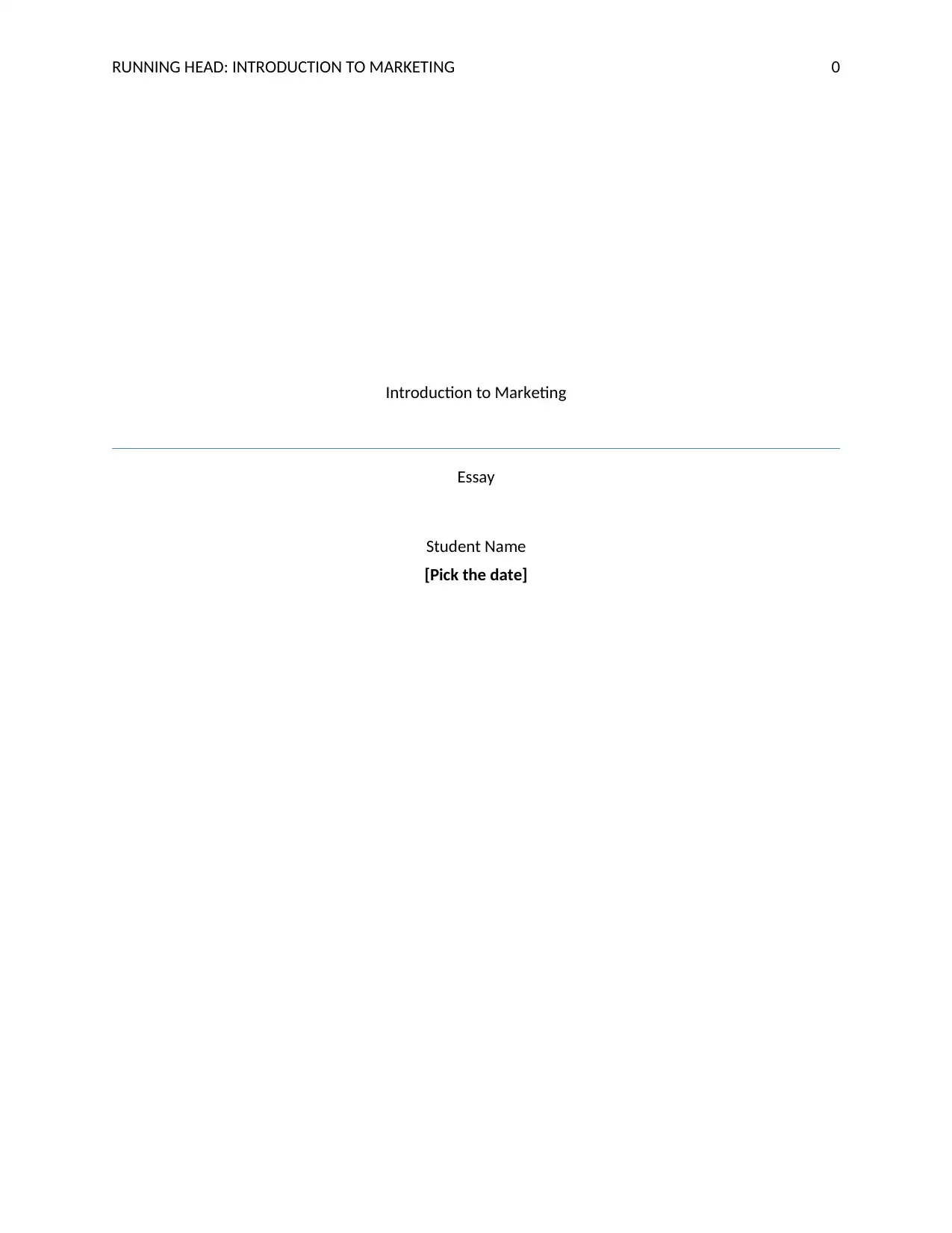
RUNNING HEAD: INTRODUCTION TO MARKETING 0
Introduction to Marketing
Essay
Student Name
[Pick the date]
Introduction to Marketing
Essay
Student Name
[Pick the date]
Paraphrase This Document
Need a fresh take? Get an instant paraphrase of this document with our AI Paraphraser
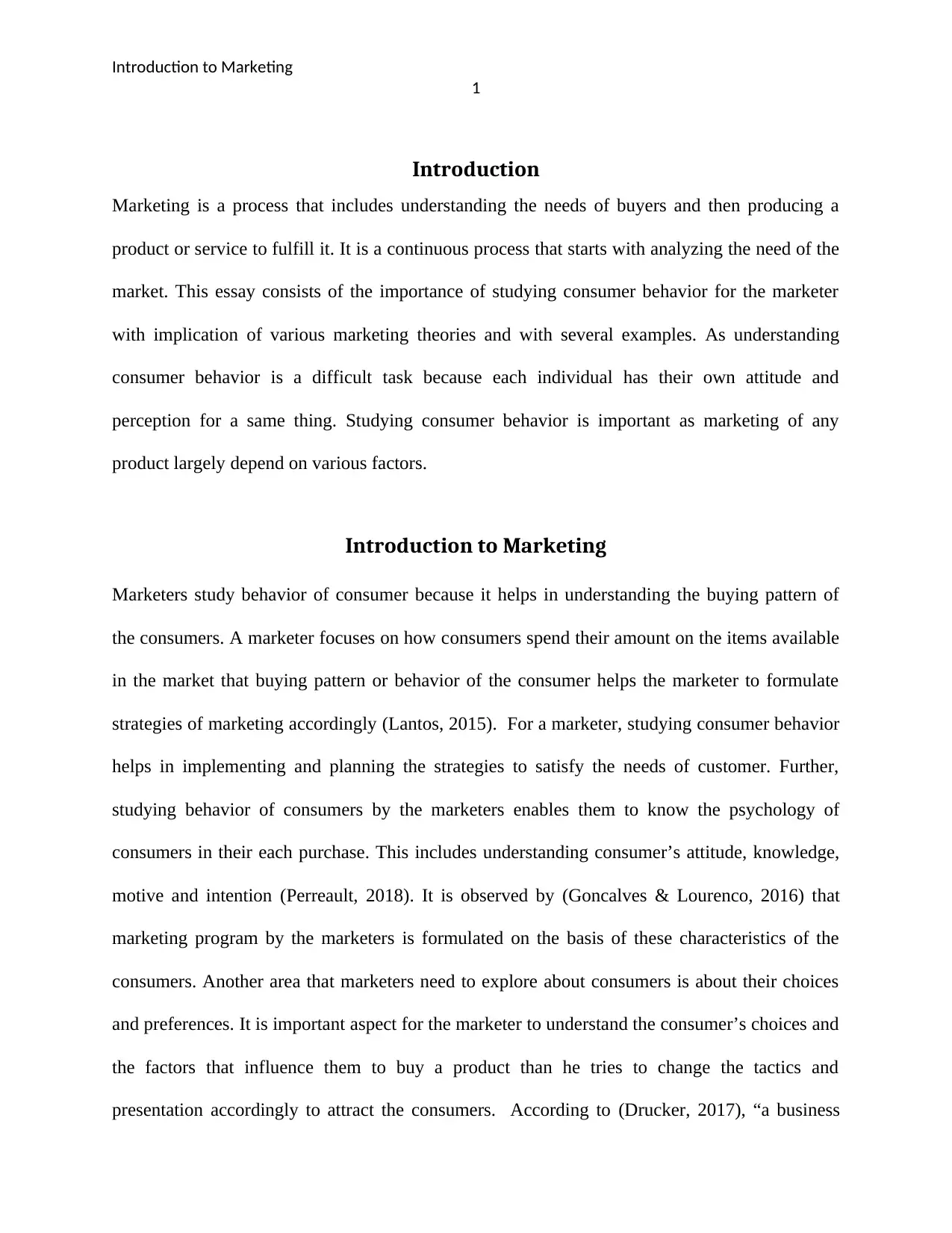
Introduction to Marketing
1
Introduction
Marketing is a process that includes understanding the needs of buyers and then producing a
product or service to fulfill it. It is a continuous process that starts with analyzing the need of the
market. This essay consists of the importance of studying consumer behavior for the marketer
with implication of various marketing theories and with several examples. As understanding
consumer behavior is a difficult task because each individual has their own attitude and
perception for a same thing. Studying consumer behavior is important as marketing of any
product largely depend on various factors.
Introduction to Marketing
Marketers study behavior of consumer because it helps in understanding the buying pattern of
the consumers. A marketer focuses on how consumers spend their amount on the items available
in the market that buying pattern or behavior of the consumer helps the marketer to formulate
strategies of marketing accordingly (Lantos, 2015). For a marketer, studying consumer behavior
helps in implementing and planning the strategies to satisfy the needs of customer. Further,
studying behavior of consumers by the marketers enables them to know the psychology of
consumers in their each purchase. This includes understanding consumer’s attitude, knowledge,
motive and intention (Perreault, 2018). It is observed by (Goncalves & Lourenco, 2016) that
marketing program by the marketers is formulated on the basis of these characteristics of the
consumers. Another area that marketers need to explore about consumers is about their choices
and preferences. It is important aspect for the marketer to understand the consumer’s choices and
the factors that influence them to buy a product than he tries to change the tactics and
presentation accordingly to attract the consumers. According to (Drucker, 2017), “a business
1
Introduction
Marketing is a process that includes understanding the needs of buyers and then producing a
product or service to fulfill it. It is a continuous process that starts with analyzing the need of the
market. This essay consists of the importance of studying consumer behavior for the marketer
with implication of various marketing theories and with several examples. As understanding
consumer behavior is a difficult task because each individual has their own attitude and
perception for a same thing. Studying consumer behavior is important as marketing of any
product largely depend on various factors.
Introduction to Marketing
Marketers study behavior of consumer because it helps in understanding the buying pattern of
the consumers. A marketer focuses on how consumers spend their amount on the items available
in the market that buying pattern or behavior of the consumer helps the marketer to formulate
strategies of marketing accordingly (Lantos, 2015). For a marketer, studying consumer behavior
helps in implementing and planning the strategies to satisfy the needs of customer. Further,
studying behavior of consumers by the marketers enables them to know the psychology of
consumers in their each purchase. This includes understanding consumer’s attitude, knowledge,
motive and intention (Perreault, 2018). It is observed by (Goncalves & Lourenco, 2016) that
marketing program by the marketers is formulated on the basis of these characteristics of the
consumers. Another area that marketers need to explore about consumers is about their choices
and preferences. It is important aspect for the marketer to understand the consumer’s choices and
the factors that influence them to buy a product than he tries to change the tactics and
presentation accordingly to attract the consumers. According to (Drucker, 2017), “a business
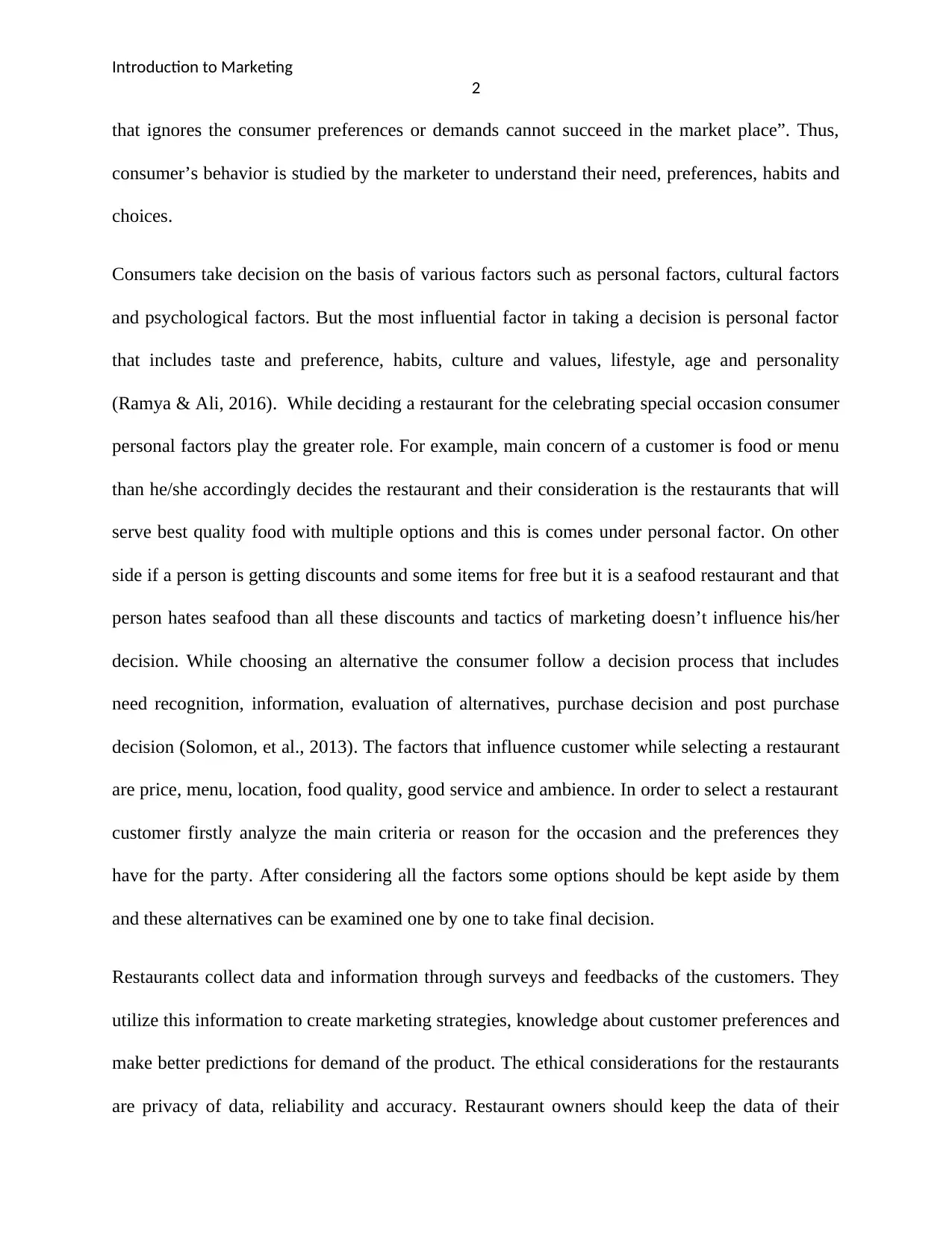
Introduction to Marketing
2
that ignores the consumer preferences or demands cannot succeed in the market place”. Thus,
consumer’s behavior is studied by the marketer to understand their need, preferences, habits and
choices.
Consumers take decision on the basis of various factors such as personal factors, cultural factors
and psychological factors. But the most influential factor in taking a decision is personal factor
that includes taste and preference, habits, culture and values, lifestyle, age and personality
(Ramya & Ali, 2016). While deciding a restaurant for the celebrating special occasion consumer
personal factors play the greater role. For example, main concern of a customer is food or menu
than he/she accordingly decides the restaurant and their consideration is the restaurants that will
serve best quality food with multiple options and this is comes under personal factor. On other
side if a person is getting discounts and some items for free but it is a seafood restaurant and that
person hates seafood than all these discounts and tactics of marketing doesn’t influence his/her
decision. While choosing an alternative the consumer follow a decision process that includes
need recognition, information, evaluation of alternatives, purchase decision and post purchase
decision (Solomon, et al., 2013). The factors that influence customer while selecting a restaurant
are price, menu, location, food quality, good service and ambience. In order to select a restaurant
customer firstly analyze the main criteria or reason for the occasion and the preferences they
have for the party. After considering all the factors some options should be kept aside by them
and these alternatives can be examined one by one to take final decision.
Restaurants collect data and information through surveys and feedbacks of the customers. They
utilize this information to create marketing strategies, knowledge about customer preferences and
make better predictions for demand of the product. The ethical considerations for the restaurants
are privacy of data, reliability and accuracy. Restaurant owners should keep the data of their
2
that ignores the consumer preferences or demands cannot succeed in the market place”. Thus,
consumer’s behavior is studied by the marketer to understand their need, preferences, habits and
choices.
Consumers take decision on the basis of various factors such as personal factors, cultural factors
and psychological factors. But the most influential factor in taking a decision is personal factor
that includes taste and preference, habits, culture and values, lifestyle, age and personality
(Ramya & Ali, 2016). While deciding a restaurant for the celebrating special occasion consumer
personal factors play the greater role. For example, main concern of a customer is food or menu
than he/she accordingly decides the restaurant and their consideration is the restaurants that will
serve best quality food with multiple options and this is comes under personal factor. On other
side if a person is getting discounts and some items for free but it is a seafood restaurant and that
person hates seafood than all these discounts and tactics of marketing doesn’t influence his/her
decision. While choosing an alternative the consumer follow a decision process that includes
need recognition, information, evaluation of alternatives, purchase decision and post purchase
decision (Solomon, et al., 2013). The factors that influence customer while selecting a restaurant
are price, menu, location, food quality, good service and ambience. In order to select a restaurant
customer firstly analyze the main criteria or reason for the occasion and the preferences they
have for the party. After considering all the factors some options should be kept aside by them
and these alternatives can be examined one by one to take final decision.
Restaurants collect data and information through surveys and feedbacks of the customers. They
utilize this information to create marketing strategies, knowledge about customer preferences and
make better predictions for demand of the product. The ethical considerations for the restaurants
are privacy of data, reliability and accuracy. Restaurant owners should keep the data of their
⊘ This is a preview!⊘
Do you want full access?
Subscribe today to unlock all pages.

Trusted by 1+ million students worldwide
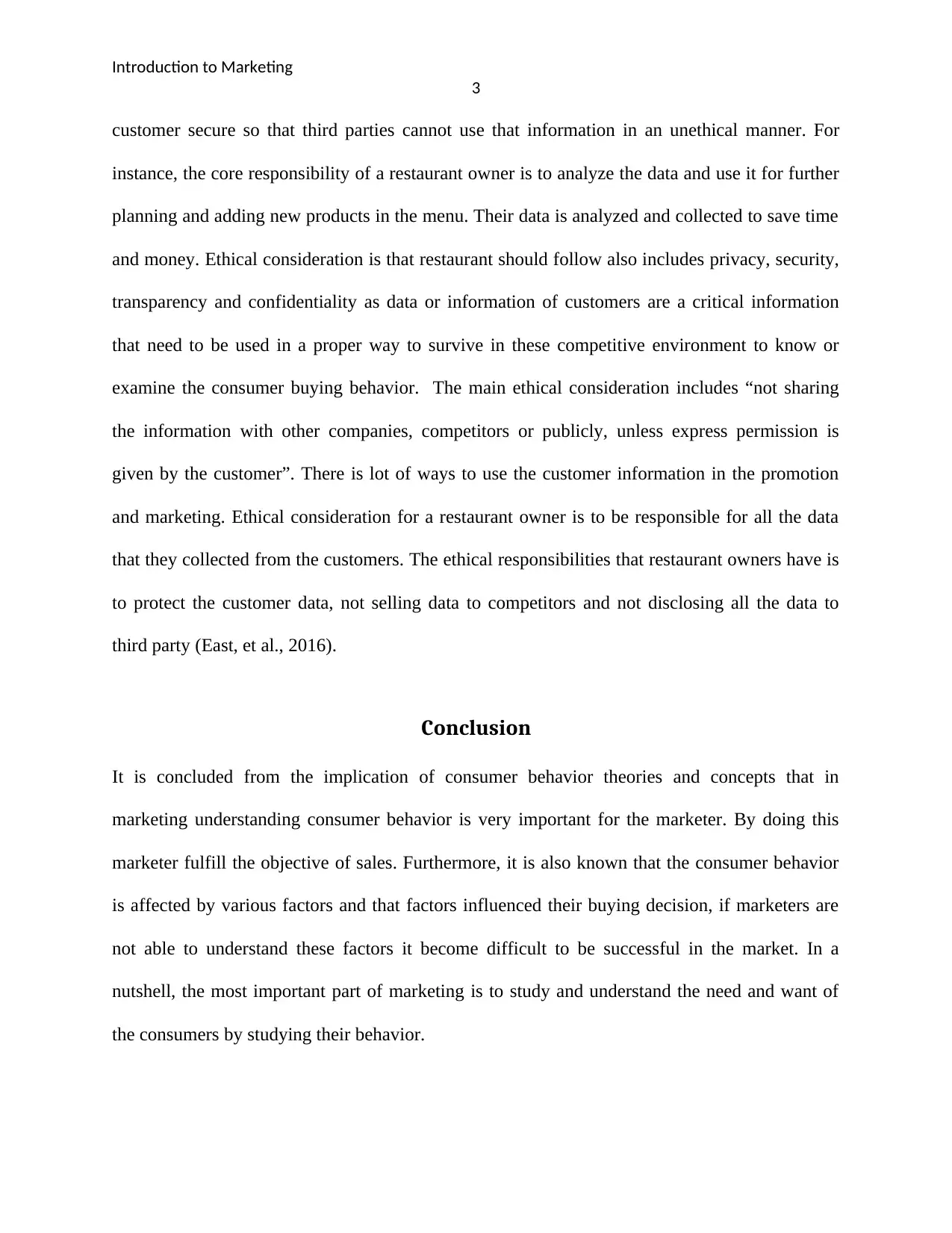
Introduction to Marketing
3
customer secure so that third parties cannot use that information in an unethical manner. For
instance, the core responsibility of a restaurant owner is to analyze the data and use it for further
planning and adding new products in the menu. Their data is analyzed and collected to save time
and money. Ethical consideration is that restaurant should follow also includes privacy, security,
transparency and confidentiality as data or information of customers are a critical information
that need to be used in a proper way to survive in these competitive environment to know or
examine the consumer buying behavior. The main ethical consideration includes “not sharing
the information with other companies, competitors or publicly, unless express permission is
given by the customer”. There is lot of ways to use the customer information in the promotion
and marketing. Ethical consideration for a restaurant owner is to be responsible for all the data
that they collected from the customers. The ethical responsibilities that restaurant owners have is
to protect the customer data, not selling data to competitors and not disclosing all the data to
third party (East, et al., 2016).
Conclusion
It is concluded from the implication of consumer behavior theories and concepts that in
marketing understanding consumer behavior is very important for the marketer. By doing this
marketer fulfill the objective of sales. Furthermore, it is also known that the consumer behavior
is affected by various factors and that factors influenced their buying decision, if marketers are
not able to understand these factors it become difficult to be successful in the market. In a
nutshell, the most important part of marketing is to study and understand the need and want of
the consumers by studying their behavior.
3
customer secure so that third parties cannot use that information in an unethical manner. For
instance, the core responsibility of a restaurant owner is to analyze the data and use it for further
planning and adding new products in the menu. Their data is analyzed and collected to save time
and money. Ethical consideration is that restaurant should follow also includes privacy, security,
transparency and confidentiality as data or information of customers are a critical information
that need to be used in a proper way to survive in these competitive environment to know or
examine the consumer buying behavior. The main ethical consideration includes “not sharing
the information with other companies, competitors or publicly, unless express permission is
given by the customer”. There is lot of ways to use the customer information in the promotion
and marketing. Ethical consideration for a restaurant owner is to be responsible for all the data
that they collected from the customers. The ethical responsibilities that restaurant owners have is
to protect the customer data, not selling data to competitors and not disclosing all the data to
third party (East, et al., 2016).
Conclusion
It is concluded from the implication of consumer behavior theories and concepts that in
marketing understanding consumer behavior is very important for the marketer. By doing this
marketer fulfill the objective of sales. Furthermore, it is also known that the consumer behavior
is affected by various factors and that factors influenced their buying decision, if marketers are
not able to understand these factors it become difficult to be successful in the market. In a
nutshell, the most important part of marketing is to study and understand the need and want of
the consumers by studying their behavior.
Paraphrase This Document
Need a fresh take? Get an instant paraphrase of this document with our AI Paraphraser
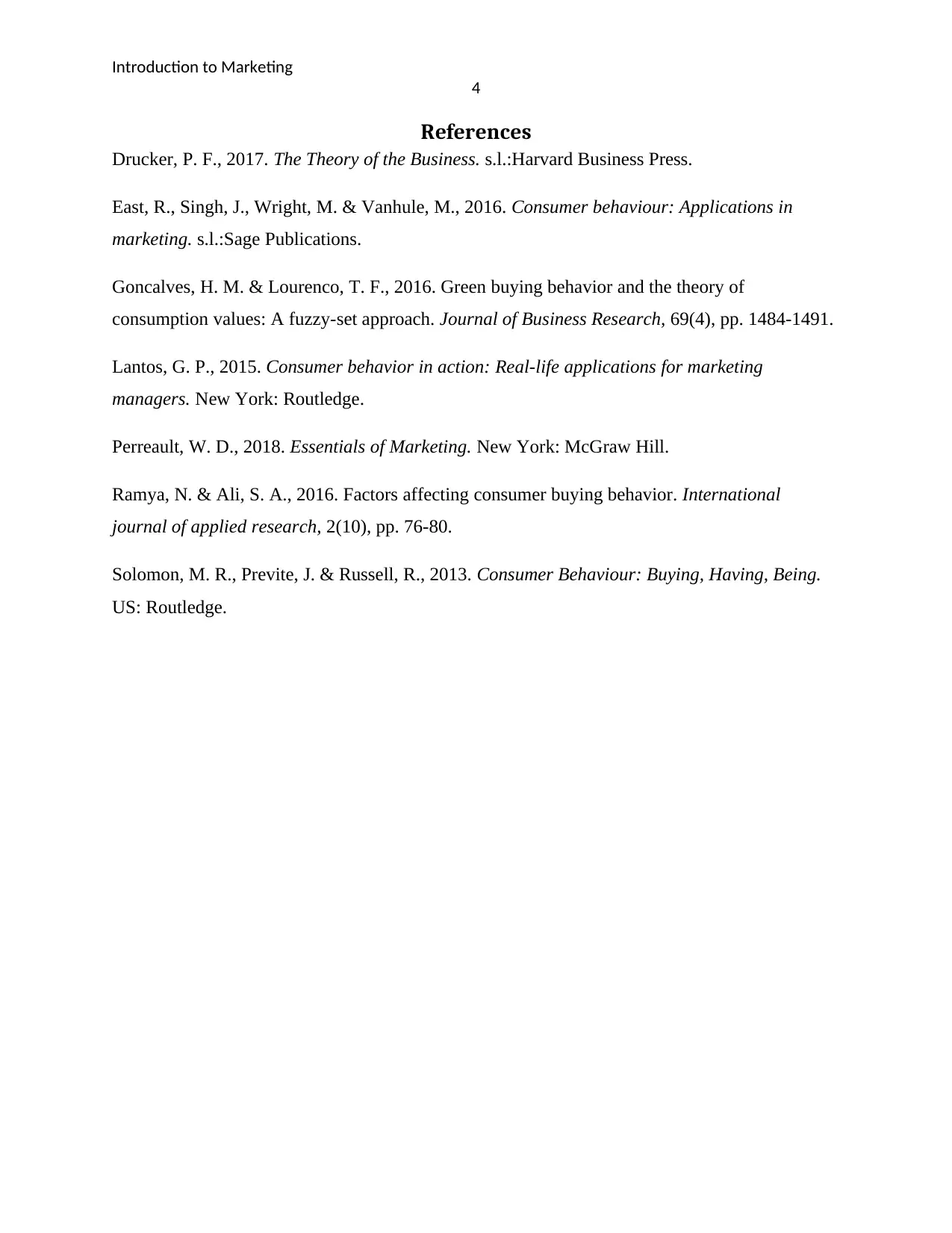
Introduction to Marketing
4
References
Drucker, P. F., 2017. The Theory of the Business. s.l.:Harvard Business Press.
East, R., Singh, J., Wright, M. & Vanhule, M., 2016. Consumer behaviour: Applications in
marketing. s.l.:Sage Publications.
Goncalves, H. M. & Lourenco, T. F., 2016. Green buying behavior and the theory of
consumption values: A fuzzy-set approach. Journal of Business Research, 69(4), pp. 1484-1491.
Lantos, G. P., 2015. Consumer behavior in action: Real-life applications for marketing
managers. New York: Routledge.
Perreault, W. D., 2018. Essentials of Marketing. New York: McGraw Hill.
Ramya, N. & Ali, S. A., 2016. Factors affecting consumer buying behavior. International
journal of applied research, 2(10), pp. 76-80.
Solomon, M. R., Previte, J. & Russell, R., 2013. Consumer Behaviour: Buying, Having, Being.
US: Routledge.
4
References
Drucker, P. F., 2017. The Theory of the Business. s.l.:Harvard Business Press.
East, R., Singh, J., Wright, M. & Vanhule, M., 2016. Consumer behaviour: Applications in
marketing. s.l.:Sage Publications.
Goncalves, H. M. & Lourenco, T. F., 2016. Green buying behavior and the theory of
consumption values: A fuzzy-set approach. Journal of Business Research, 69(4), pp. 1484-1491.
Lantos, G. P., 2015. Consumer behavior in action: Real-life applications for marketing
managers. New York: Routledge.
Perreault, W. D., 2018. Essentials of Marketing. New York: McGraw Hill.
Ramya, N. & Ali, S. A., 2016. Factors affecting consumer buying behavior. International
journal of applied research, 2(10), pp. 76-80.
Solomon, M. R., Previte, J. & Russell, R., 2013. Consumer Behaviour: Buying, Having, Being.
US: Routledge.
1 out of 5
Related Documents
Your All-in-One AI-Powered Toolkit for Academic Success.
+13062052269
info@desklib.com
Available 24*7 on WhatsApp / Email
![[object Object]](/_next/static/media/star-bottom.7253800d.svg)
Unlock your academic potential
Copyright © 2020–2026 A2Z Services. All Rights Reserved. Developed and managed by ZUCOL.





